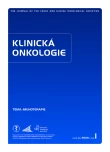-
Medical journals
- Career
Management of Immune-Related Endocrinopathies in Anticancer Treatment with Checkpoint Inhibitors
Authors: R. Lakomý 1; A. Poprach 1; T. Kazda 2
Authors‘ workplace: Klinika komplexní onkologické péče LF MU a Masarykův onkologický ústav, Brno 1; Klinika radiační onkologie LF MU a Masarykův onkologický ústav, Brno 2
Published in: Klin Onkol 2020; 33(1): 15-19
Category: Review
doi: https://doi.org/10.14735/amko202015Overview
Modern immunotherapy with checkpoint inhibitors has become the backbone treatment for many cancers. However, it is often accompanied by immune-related side effects, which may differ depending on the nature of the treatment. The frequency of adverse reactions increases with the number of patients receiving immunotherapy. The situation has become even more difficult with the advent of combination immunotherapy. Although the kinetics of the onset and duration of toxicity have been well described, caution should be exercised. In clinical practice, cases with atypical courses often occur. Ignorance of the problem can lead to underestimation of symptoms and damage to the patient. Immune-related side effects are variable and any organ can be affected. In addition to skin, intestinal and liver toxicity, immune-related endocrinopathy is another relatively frequent toxicity. Thyroid, pituitary and adrenal glands are most commonly affected. Symptoms of endocrinopathy are often nonspecific, which may complicate a differential diagnosis. Fortunately, most toxicities are grade 1 and 2; however, in routine clinical practice, care must be exercised to detect the onset of life-threatening toxicity such as an adrenal crisis or type 1 diabetes mellitus with ketoacidosis. It is unclear whether high doses of corticosteroids are effective in preserving endocrine gland function. Long-term hormone replacement therapy is essential because immune-related endocrinopathy is often irreversible, unlike other immune-related toxicities. Close cooperation with an endocrinologist is therefore very important.
This work was supported by MH CZ – DRO (MMCI, 00209805).
The authors declare they have no potential conflicts of interest concerning drugs, products, or services used in the study.
The Editorial Board declares that the manuscript met the ICMJE recommendation for biomedical papers.
Keywords:
imunotherapy – drug toxicity – hypophysitis – thyroiditis
Sources
1. Wang DY, Salem JE, Cohen JV et al. Fatal toxic effects associated with immune checkpoint inhibitors: a systematic review and meta-analysis. JAMA Oncol 2018; 4 (12): 1721–1728. doi: 10.1001/jamaoncol.2018.3923.
2. Lakomý R, Poprach A. Sideeffects of modern immunotherapy and how to solve them in the clinics. Klin Onkol 2015; 28 (Suppl 4): 4S103–4S114. doi: 10.14735/amko20154S103.
3. Larkin J, Chiarion-Sileni V, Gonzalez R et al. Combined nivolumab and ipilimumab or monotherapy in untreated melanoma. N Engl J Med 2015; 373 (1): 23–34. doi: 10.1056/NEJMoa1504030.
4. Eggermont AM, Chiarion Sileni V, Grob JJ et al. Prolonged survival in stage III melanoma with ipilimumab adjuvant therapy. N Engl J Med 2016; 375 (19): 1845–1855. doi: 10.1056/NEJMoa1611299.
5. Weber JS, Hodi FS, Wolchok JD et al. Safety profile of nivolumab monotherapy: a pooled analysis of patients with advanced melanoma. J Clin Oncol 2017; 35 (7): 785–792. doi: 10.1200/JCO.2015.66.1389.
6. Robert C, Schachter J, Long GV et al. Pembrolizumab versus ipilimumab in advanced melanoma. N Engl J Med 2015; 372 (26): 2521–2532. doi: 10.1056/NEJMoa1503093.
7. Cukier P, Santini FC, Scaranti M et al. Endocrine side effects of cancer immunotherapy. Endocr Relat Cancer 2017; 24 (12): 331–347. doi: 10.1530/ERC-17-0358.
8. Mellati M, Eaton KD, Brooks-Worrell BM et al. Anti-PD-1 and antiPDL-1 monoclonal antibodies causing type 1 diabetes. Diabetes Care 2015; 38 (9): 137–138. doi: 10.2337/dc15-0889.
9. Weber JS, Kähler KC, Hauschild A. Management of immune-related adverse events and kinetics of response with ipilimumab. J Clin Oncol 2012; 30 (21): 2691–2697. doi: 10.1200/JCO.2012.41.6750.
10. Girotra M, Hansen A, Farooki A et al. The current understanding of the endocrine effects from immune checkpoint inhibitors and recommendations for management. JNCI Cancer Spectr 2018; 2 (3): pky021. doi: 10.1093/jncics/pky021.
11. Haanen JB, Carbonnel F, Robert C et al. Management of toxicities from immunotherapy: ESMO Clinical Practice Guidelines for diagnosis, treatment and follow-up. Ann Oncol 2017; 28 (Suppl 4): 119–142. doi: 10.1093/annonc/mdx225.
12. Sznol M, Postow MA, Davies MJ et al. Endocrine-related adverse events associated with immune checkpoint blockade and expert insights on their management. Cancer Treat Rev; 58 : 70–76. doi: 10.1016/j.ctrv.2017.06. 002.
Labels
Paediatric clinical oncology Surgery Clinical oncology
Article was published inClinical Oncology

2020 Issue 1-
All articles in this issue
- Side Effects and Efficacy of Immunotherapy
- Neurotoxicity and Immunotherapy
- Management of Immune-Related Endocrinopathies in Anticancer Treatment with Checkpoint Inhibitors
- Immunotherapy-Associated Myocarditis
- Gastrointestinal Toxicity of Immunotherapy
- Renal Toxicity of Cancer Immunother apy
- The Importance of Cancer-Associated Fibroblasts in the Pathogenesis of Head and Neck Cancers
- Long-Term Clinical Results of IGRT in Prostate Cancer Treatment
- Programmed Death-Ligand 1 Expression in Non-Small Cell Lung Carcinoma Biopsies and Its Association with Tumor Infi ltrat ing Lymphocytes and the Degree of Desmoplasia
- Novel Aspects of Genetics, Molecular Biology and Clinical Oncology of Sarcomas
- Editorial
- Aktuality z odborného tisku
- The Important Role of STAT3 in Chronic Lymphocytic Leukaemia Biology
- Clinical Oncology
- Journal archive
- Current issue
- Online only
- About the journal
Most read in this issue- Side Effects and Efficacy of Immunotherapy
- Neurotoxicity and Immunotherapy
- The Important Role of STAT3 in Chronic Lymphocytic Leukaemia Biology
- Immunotherapy-Associated Myocarditis
Login#ADS_BOTTOM_SCRIPTS#Forgotten passwordEnter the email address that you registered with. We will send you instructions on how to set a new password.
- Career

